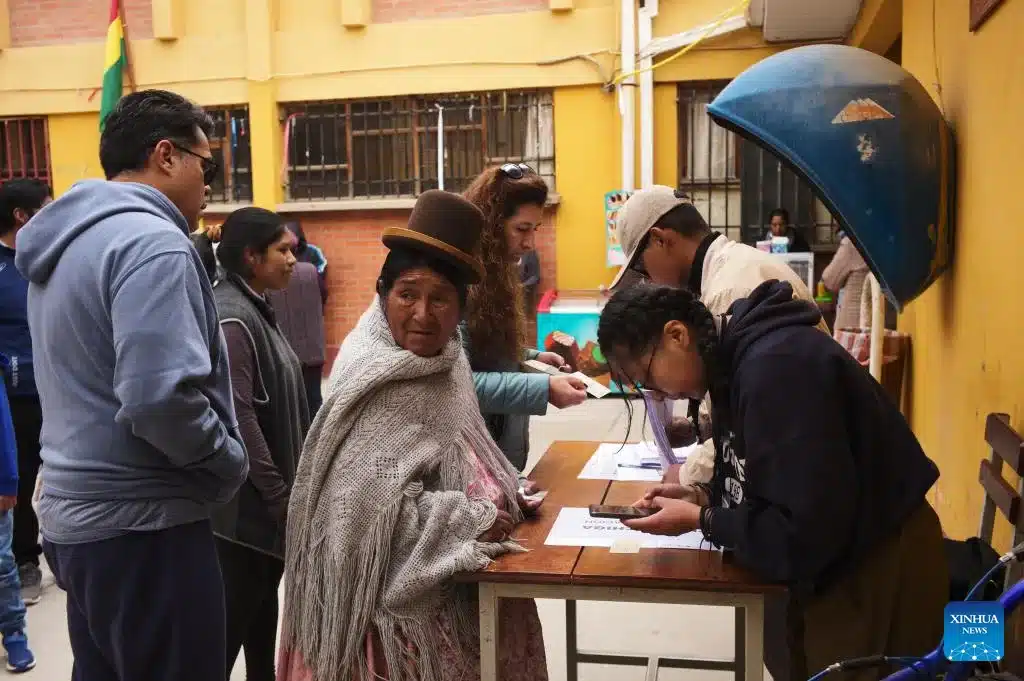
Voters queue to cast their ballots at a polling station in La Paz, Bolivia, August 17, 2025. Photo: Xinhua/Zhao Kai.

Orinoco Tribune – News and opinion pieces about Venezuela and beyond
From Venezuela and made by Venezuelan Chavistas

Voters queue to cast their ballots at a polling station in La Paz, Bolivia, August 17, 2025. Photo: Xinhua/Zhao Kai.
By Sacha Llorenti – Aug 18, 2025
The electoral hegemony that won the last six national elections with a percentage greater than or close to 50% has, on the electoral level, suffered its first major defeat. What remains to be done?
As with all deadlines, the election date in Bolivia has arrived. These elections take place twenty years after Evo Morales’s electoral victory, which led the country to become a Plurinational State and to experience the period of greatest political stability, economic growth, and social justice in the country’s bicentennial history.
The central result is that Bolivia’s largest political movement has lost political power. The former electoral hegemony that won the last six national elections with a percentage greater than or close to 50% has suffered its first major electoral defeat.
Before analyzing the causes and possible consequences, let’s look at the preliminary data: Rodrigo Paz Pereira, son of former President Jaime Paz, surprises by securing over 32% of the vote; Jorge Quiroga, the eternal ally of the most rancid international right, reached 27%; Samuel Doria Medina, cursed with constant defeat, at 20%; Andrónico Rodríguez, about whom we write in the following lines, a little over 8%; Manfred Reyes Villa, the former military man, Zionist, at 6.6%; and E. Del Castillo, with the stolen acronym of the MAS-IPSP, a little over 8% and at serious risk of losing the party’s legal status.
A crucial fact concerns the spoiled vote. Evo Morales and the systematically banned indigenous and peasant social organizations, who were violently repressed by the Luis Arce government, decided to campaign for the spoiled vote as a protest against the illegitimacy of the elections. The spoiled vote never had much relevance in the last elections and averaged around three percent. In these elections, they delivered a major surprise and a significant lesson, reaching 20% of the total vote, without financial resources and under the harassment of most of the media.
There will be a runoff between Paz and Quiroga. Two right-wing candidates will seek the support of other right-wing parties, which will radicalize their campaign in that direction. The right-wing parties account for approximately 70% of the votes. If they unite, they will have a supermajority in the Legislative Assembly and will attempt to reverse the profound transformations of the Evo Morales presidency.
And the left?
The Luis Arce administration did everything in its power to try to destroy Evo Morales’s leadership: stealing the MAS-IPSP acronym, eliminating any possibility of participation under any other acronym, violently taking over social organizations, disqualifying Evo Morales, making an attempt on his life, persecuting and imprisoning more than 100 people who protested against the ban, and, as reported by Diario Red, paying off judges and members of the Supreme Electoral Tribunal to remove him from the electoral board.
In the case of Andrónico Rodríguez, who saw himself as the natural political heir to Evo Morales’s leadership, he decided to run for office behind the backs of and against the decisions of social organizations. The election result is clear and incontrovertible proof that his decision ultimately legitimized an election that was tainted by the banning of Bolivia’s most important political movement.
The Dreadful Division of the Left in Bolivia Paves the Way for the Right
Regarding Evo Morales, it is a grave error or disqualifying ignorance to attempt to diminish his position as if it were a personal matter, or worse, a matter of his generosity or selfishness. It is the indigenous and peasant social organizations, the essence of the Political Instrument, that, as a result of a debate within their structures, decided to protest the proscription, not legitimize the elections, and annul their votes.
Evo Morales was the only one who proposed holding closed or open primaries, or conducting “Mexican-style” polls for the election or selection of the popular movement’s candidate. Arce and Rodríguez decided to rule out that possibility and build their electoral proposals on what they believed to be the ashes of Evo Morales’s leadership. They were wrong.
The elections allow us to objectively identify the position of the Bolivian popular movement. The results are clear: it is with the indigenous and peasant social organizations, and they are with Evo Morales.
What remains to be done?
The election result is bad. The right will have political control amid a severe economic crisis. Now, they will try to apply the old, failed strategies of shifting the burden of this crisis onto the poorest. Given this scenario, and as was done during the 2019 coup d’état, it is essential to reorganize around indigenous, peasant, and popular social organizations, under the leadership of Evo Morales. Andrónico Rodríguez has the opportunity and responsibility to return to these organizations and, together, face the next battle: the campaign for the null vote in the second round of elections.
(Diario Red)
Translation: Orinoco Tribune
OT/JB/SH